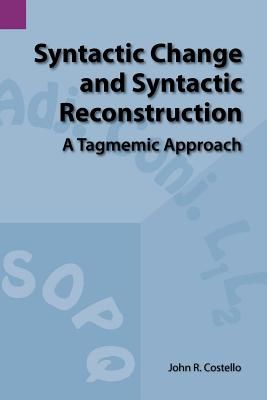Home
Syntactic Reconstruction and Proto-Germanic
Loading Inventory...
Barnes and Noble
Syntactic Reconstruction and Proto-Germanic
Current price: $155.00


Barnes and Noble
Syntactic Reconstruction and Proto-Germanic
Current price: $155.00
Loading Inventory...
Size: OS
*Product Information may vary - to confirm product availability, pricing, and additional information please contact Barnes and Noble
This book offers reconstructions of various syntactic properties of Proto-Germanic, including verb position in main clauses, the syntax of the
wh
-system, and the (non-)occurrence of null pronominal subjects and objects. Although previous studies have looked at the lexical and phonological reconstruction of Proto-Germanic, little is currently known about the syntax of the language, and it has even been argued that the reconstruction of syntax is impossible.
Dr Walkden uses extensive evidence from the early Germanic languages - Old English, Old High German, Old Saxon, Old Norse, and Gothic - to show that syntactic reconstruction is not only possible but also profitable. He argues that while the reconstruction of syntax differs from lexical-phonological reconstruction due to the so-called 'correspondence problem', this is not insurmountable. In fact, the approach taken in current Minimalist theories, in which syntactic variation is attributed to the properties of lexical items, opens the door for syntactic reconstruction as lexical reconstruction. The book also discusses practical solutions for circumventing the correspondence problem, in particular the use of both distributional properties of lexical items and the phonological forms of such items in order to establish cognacy.
The book will be of interest to historical linguists working on syntactic reconstruction and the Germanic languages, from graduate level upwards, as well as to advanced students of syntactic change more generally.
wh
-system, and the (non-)occurrence of null pronominal subjects and objects. Although previous studies have looked at the lexical and phonological reconstruction of Proto-Germanic, little is currently known about the syntax of the language, and it has even been argued that the reconstruction of syntax is impossible.
Dr Walkden uses extensive evidence from the early Germanic languages - Old English, Old High German, Old Saxon, Old Norse, and Gothic - to show that syntactic reconstruction is not only possible but also profitable. He argues that while the reconstruction of syntax differs from lexical-phonological reconstruction due to the so-called 'correspondence problem', this is not insurmountable. In fact, the approach taken in current Minimalist theories, in which syntactic variation is attributed to the properties of lexical items, opens the door for syntactic reconstruction as lexical reconstruction. The book also discusses practical solutions for circumventing the correspondence problem, in particular the use of both distributional properties of lexical items and the phonological forms of such items in order to establish cognacy.
The book will be of interest to historical linguists working on syntactic reconstruction and the Germanic languages, from graduate level upwards, as well as to advanced students of syntactic change more generally.


















